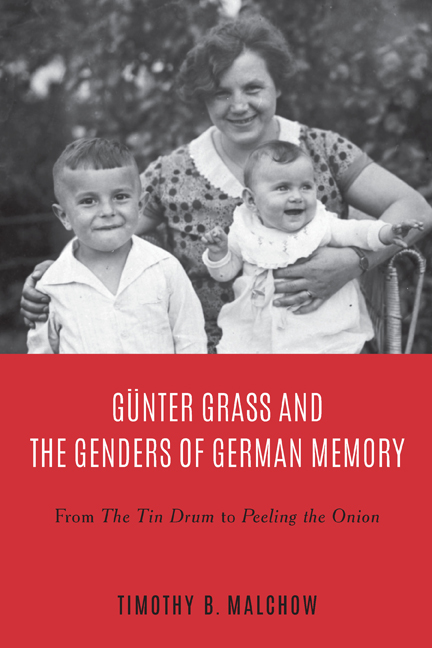Book contents
- Frontmatter
- Dedication
- Contents
- Acknowledgments
- Abbreviations, Translations, and Transcriptions
- Introduction
- 1 Grass’s Biography in Context: 1927–1959
- 2 Corporeal Memory, Trauma, and Art in The Tin Drum
- 3 Bildung, Heimat, and Gendered Modes of German Memory in The Tin Drum
- 4 A Patriarchal Arbiter of German Cultural Memory and His Feminized Others: Leveling Bildung, Opening Heimat, and Championing Art from the 1960s to the New Millennium
- 5 Grass’s Early Life Once Again: Broken Silence, Mourning, and Gendered Approaches to Memory in Peeling the Onion
- Epilogue
- Works Cited
- Index
4 - A Patriarchal Arbiter of German Cultural Memory and His Feminized Others: Leveling Bildung, Opening Heimat, and Championing Art from the 1960s to the New Millennium
Published online by Cambridge University Press: 09 February 2021
- Frontmatter
- Dedication
- Contents
- Acknowledgments
- Abbreviations, Translations, and Transcriptions
- Introduction
- 1 Grass’s Biography in Context: 1927–1959
- 2 Corporeal Memory, Trauma, and Art in The Tin Drum
- 3 Bildung, Heimat, and Gendered Modes of German Memory in The Tin Drum
- 4 A Patriarchal Arbiter of German Cultural Memory and His Feminized Others: Leveling Bildung, Opening Heimat, and Championing Art from the 1960s to the New Millennium
- 5 Grass’s Early Life Once Again: Broken Silence, Mourning, and Gendered Approaches to Memory in Peeling the Onion
- Epilogue
- Works Cited
- Index
Summary
GRASS's PROSE WORKS of the near half-century between The Tin Drum and his related memoir, Peeling the Onion (Beim Häuten der Zwiebel), elaborate on that first novel's dualistic gender system while engaging with the implications of cultural memory of Nazism for German society. Generally, the texts’ autobiographically based narrators identify with the alternative masculinity of a pedagogically motivated artist and representative of the German cultural nation, who pursues the possibility of Bildung and confronts an inferior masculinity manifest in the false memories and dubious narratives supporting the cultural-political status quo. From the viewpoints of Grass's narrators, maternal figures evoke associations of Heimat in varying ways, and other women present threats and challenges to masculine identity formation or social progress. Grass's narratives often feminize elusive progress and authentic memory, staging the masculine narrators’ sometimes sexualized relations to them in the struggle to mediate truths for the cultural nation.
In chapter 5 of this study I explore Peeling the Onion. In this fourth chapter I examine Grass's prose works and public statements of the forty-seven years leading up to its publication, against the background of developments in German memory culture. The necessarily cursory attention paid to individual texts here does not reflect my assessment of their quality as literature. To examine Grass's literary production and statements during this period in detail would far exceed the scope of this book, with its primary focus on gendered representations of memory in The Tin Drum and Peeling the Onion. And yet certain developments from the 1960s to the early 2000s are so relevant to the later memoir's treatment of memory and gendered cultural authority that they merit examination here.
Grass in the 1960s: The Cultural Nation and the New Bildungsroman
By the early 1960s, the new public focus on Nazi crimes lent credibility to Grass's statements and to The Tin Drum's portrait of a West German society in denial. The 1961 novella Cat and Mouse features another remembering, masculine narrator, Pilenz, who at times, like Oskar in The Tin Drum, tries to repress his Nazi-era guilt concerning his friend Joachim Mahlke, by conjuring the distracting image of the adolescent girl who often accompanied them and their friends:
- Type
- Chapter
- Information
- Günter Grass and the Genders of German MemoryFrom The Tin Drum to Peeling the Onion and Beyond, pp. 121 - 161Publisher: Boydell & BrewerPrint publication year: 2021

